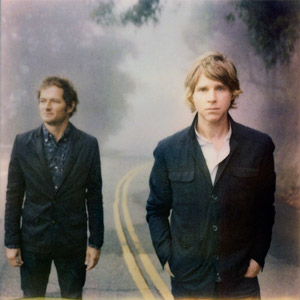
Pat Sansone began working with John Stirratt a few years before he ever became a part of the bassist’s other project, a little band called Wilco. While that group has undergone its fair share of musical evolution over the past decade or so, the same can also be said for Sansone and Stirratt’s other gig, The Autumn Defense. The duo may play second-fiddle to the formidable songwriting prowess of Jeff Tweedy when Wilco is in session, but their appropriately titled fifth studio album, Fifth, once again proves that the pair are perfectly capable of crafting some elegant tunes of their own. We caught up with Sansone recently to discuss the band’s new album, balancing successful music projects, the future of Wilco and more.
The new Autumn Defense have a new new album, Fifth. Does this release explore familiar territory or are you guys going into something different with this one?
I think it’s kind of a combination of both. It’s definitely us; it sounds like us. It’s coming from a similar point of inspiration as everything else that we do as The Autumn Defense. But there was a conscious effort this time where we started making a record to get our live band in the studio; get everybody in the studio together at one time and start the record with some live performances at the tracking stage. We’ve done that before on the other records, but this time we wanted it to be this specific group of musicians that we’ve been working with live for the last several years.
Is that something that you normally do? Or is that something you first did for this album?
No we’ve produced our own records really since the beginning. This record is really the first to have a co-producer and his name is Josh Shapera. He and I have a studio together in Chicago called the Nixon Administration and we’ve been working on some projects together—producing other artists—and he co-produced this record. But yeah, we’ve pretty much handled the production duties on our own records since the beginning.
What are some of the challenges in doing that? Does it make the whole process a little more difficult?
Well, it was really helpful to have him on this because, when I have assumed production duties on a project that I’m also playing in, it does get a little tricky because you sort of have to split your head in two. You have to simultaneously be looking at the big picture and making sure things are going in a certain way. But then you have to also allow yourself to hopefully be spontaneous and be in the moment and just be a performer. So it was really good this time around to have a co-producer so that, when we were in the room making music, I could turn off that micromanaging part of my brain and allow myself to play and perform. I think it really helped the flow of the record.
You said earlier that you guys brought your touring band into the studio to help you record this. Did that make the songwriting process any different? Do they help with the writing at all?
Yeah, in a way. John and I would bring the songs—already completely written and formed—to the sessions, and they’re very quick studies and they know the vibe at this point so they’re able to sort of jump right in. it’s very natural and very quick. But there were a few songs that were really just sort of musical ideas that were brought to the band. You know, we were really just jamming in the studio, but those jam sessions really did help turn those ideas into actual songs. There’s a song called “Calling Your Name” on the record that was really just an instrumental idea that our drummer, Greg, once he started playing drums to it, that was what really helped turn it into a song. So that really did help bring some of our unformed ideas to life.
Jonathan Wilson played on your last album. Did you guys bring any special guests in for this one?
We had a couple of friends from Chicago come and play and do a couple of very small cameos. Our friends Nick Broste and Max Crawford played horns on a couple of tunes. But for the most part it was just us; it was just the band. It was very self-contained. We made it almost completely in our own studio, and it was done entirely in Chicago. So it was very much a family affair.


No Comments comments associated with this post